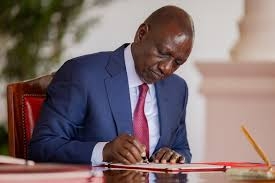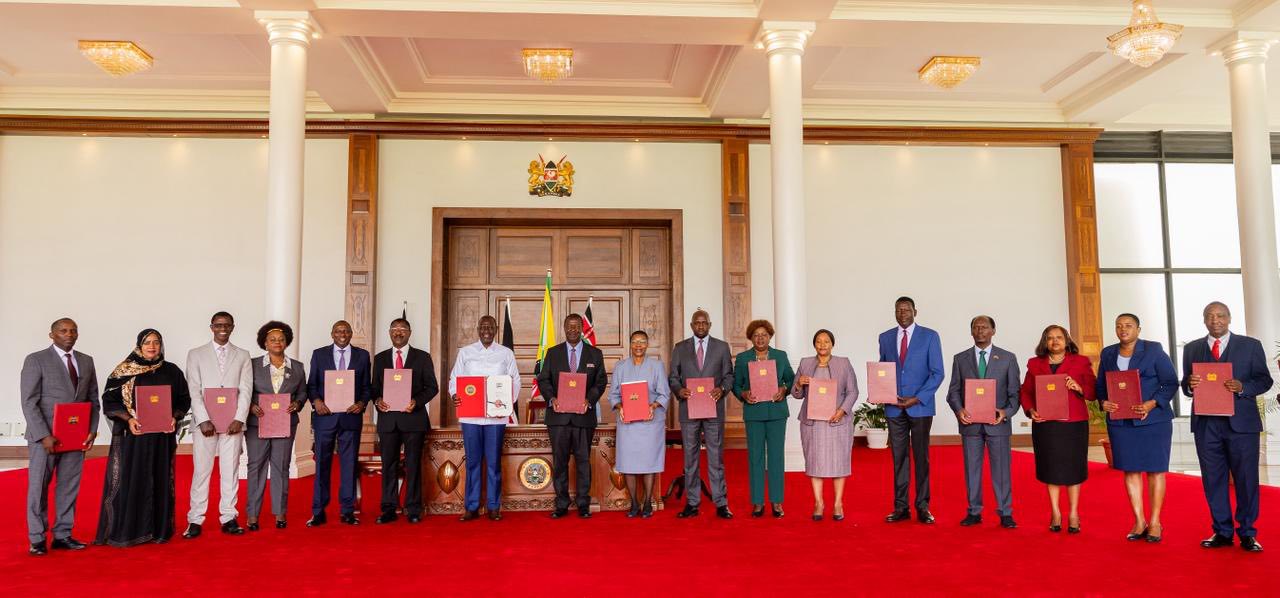

The government is seeking to quell public concerns raised
over last week’s assent into law of eight bills by President William Ruto.
Lands and Physical Planning Principal Secretary Nixon Korir
and his Parliamentary Affairs counterpart in the Office of the Prime Cabinet
Secretary, Aurelia Rono, have issued separate statements addressing the
controversy.
Korir specifically sought to clarify the changes made to
land laws, saying the amendments emanated from a Private Member’s Bill
sponsored by Ruiru MP Simon King’ara (UDA) and not from the Leader of the Majority
in the National Assembly.
The Bill amended the Land Act to require the Chief Land
Registrar to register all public land allocated to a public body or institution
by the National Land Commission (NLC), as well as any land set aside by a
developer for public purposes in their approved development plan.
“The amendments further require the registration of public
land and land earmarked for public amenities to be published in the Kenya
Gazette to ensure that all public land and land set aside by developers for
public amenities, such as schools and hospitals, are registered and publicized.
This will prevent any grabbing of the land or its later use for private
purposes,” PS Korir said in a statement.
He added:
“The information circulating on social media about the conversion of land regimes from freehold to leasehold and the purported
introduction of levies is misleading and not factual.”
On her part, PS Rono placed a one-page advertisement in the
Standard newspaper of Thursday, October 23, 2025, to explain the changes
introduced in the amendments affecting eight pieces of legislation.
“The recently enacted Bills seek to infuse much-needed reforms and enhance government efficiency, including the State’s capacity to respond to crimes and financial tools that have emerged courtesy of recent advances in technology,” Rono said.
She added:
“The Bills also reinforce our collective commitment to
address historical injustices, entrench equity and transparency, and accelerate
national development and transformation.”
The PS said that following the assent of the amendments into
law, there had been incidents of misreporting that caused public outcry, hence
the need for clarification.
“It is, however, noteworthy that following the assent of the
Bills, there has been misreporting of their contents, which has created huge
public debate. To this end, there is a need to appraise the public on the
contents and implications of the Bills, in furtherance of the constitutional
values of transparency and good governance,” Rono stated.
On October 15, 2025, President Ruto assented to nine key
bills, marking major reforms across the governance, economic, and digital
sectors.
Among them were the National Land Commission (Amendment) Bill, Wildlife Conservation and Management (Amendment) Bill, Land (Amendment) Bill, Privatization Bill, Computer Misuse and Cybercrimes (Amendment) Bill, Air Passenger Service Charge (Amendment) Bill, and National Police Service Commission (Amendment) Bill.
Already, the High Court has suspended the implementation of sections of the Computer Misuse and Cybercrimes (Amendment) Act pending determination of a case filed by activists and journalists.
On the Virtual Asset Service Providers Bill, 2025, PS Rono
said it was sponsored by Leader of Majority Kimani Ichung’wah and seeks to
regulate virtual asset activities in and from Kenya.
“The Bill seeks to remedy Kenya’s grey-listing by the
Financial Action Task Force for lack of regulation of virtual activities. It
further designates the Central Bank of Kenya and the Capital Markets Authority
as the principal regulatory authorities to license and regulate the activities
of Virtual Asset Providers,” she explained.
Rono concluded:
“From the foregoing, it is notable that five of the eight
Acts originated from Private Members, which is a testament to the inclusivity
and openness of the current legislative environment. It affirms that ideas in
Kenya’s democracy are judged not by who brings them forward, but by their merit
and value to the nation.”













